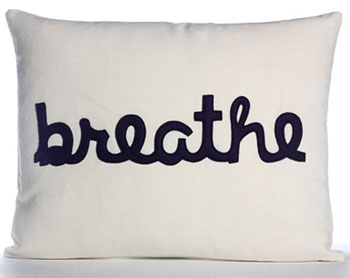Imagine a company that sells crafts from around the world online being worth about $2 billion – that would be Etsy, which went public last week on Nasdaq (ticker: ETSY).
The second B Corp to go public, Etsy believes social and environmental values are more important than profits. We’ll see how that goes on Nasdaq, where analysts will be looking for ever-increasing short-term profits.
Brooklyn, NY-based Etsy raised $267 million in its IPO for its online marketplace, where craftspeople around the world sell their unique products.
Since its founding in 2005, Etsy has grown to host 1.4 million active sellers in 200 countries and almost 20 million active buyers – people who have purchased from the site in the past year. Sales rose 56% last year to $196 million, but there was still a loss of $15.2 million, and a cumulative loss of $32.4 million.
In 2013, craftspeople that sell on Etsy grossed over $1.35 billion in sales.
Alexandra Ferguson employs 5 people making these pillows from recycled materials:

Etsy says, "We see a world in which very-very small businesses have much, much more sway in shaping the economy. Local living economies are thriving everywhere, and people value authorship and provenance as much as price and convenience. Etsy is bringing heart to commerce and making the world more fair, more sustainable, and more fun."
In its IPO Prospectus, Etsy plainly admits its history of operating losses and says it "may not achieve or maintain profitability in the future." It also says, "Adherence to our values and our focus on long-term sustainability may negatively influence our short- or medium-term financial performance."
Some of Etsy’s Practices
Employees: Part-time, temporary workers receive at least 43% more than their local living wage; covers over 80% of health insurance premiums for employees and their families; pays for five days of volunteer time each year; all employees have stock or stock options and receive weekly financial reports on the company.
Environment: they bike all their compost to local community farms every week; energy efficiency and waste reduction programs; use of reclaimed furniture.
And Etsy has created a "Craft Entrepreneurship" program" – 14 hours of curriculum that where potential craftspeople learn everything from marketing to search engine optimization. So far it’s offered in 10 cities.
Some Statistics on B Corps:
- 72% use renewable energy
- 51% offer mass transit or carpooling incentives
- 30 times more likely to be located in green buildings
- 82% have programs for volunteering in local communities
- 30 times more likely to donate at least 10% of profits to charity
- 90% are locally owned, and are three times more likely to be owned by minorities or women
- 44% offer some form of employee ownership
- twice as likely to offer health insurance and retirement plans
- 25% save money as a direct result of B certification
Philadelphia actually rewards B Corps through tax breaks! A great idea that other cities should pick up on. They usually make up about a third of America’s Most Promising Social Entrepreneurs, produced each year by Bloomberg BusinessWeek.
For decades, companies that prioritize social and environmental concerns on the same level as profits have wanted a special designation (other than LLC, Corporation, etc) and in 2010 they got it – registering a business as a Benefit Corporation is now legal in 27 states.
Etsy is one of 1000 B Corps in the US. Check out their top companies for 2015:

I think this is great news. Considering Q1 of 2015 was the least active quarter in offering activity in two years, I think we could use this. (Source: BDO).
Just to give out all I am blessed with to those in need